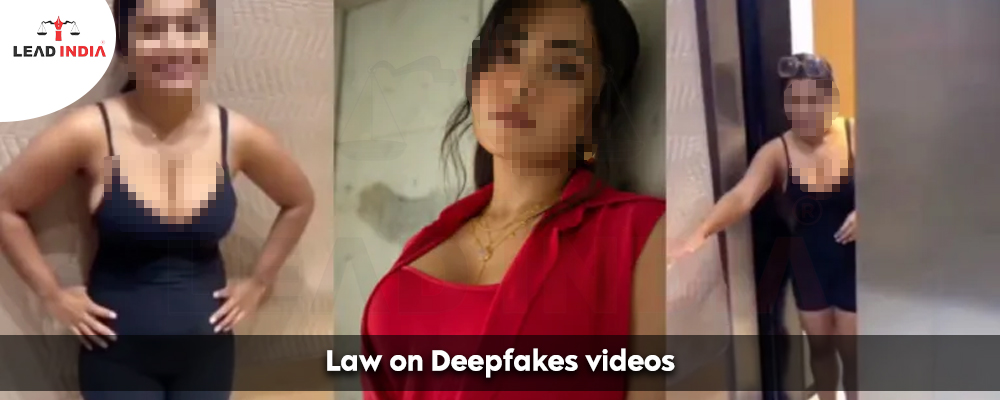On November 7, 2023, a day after a licentious video of actor Rashmika Mandanna leaked on multiple social media sites, she released a statement questioning its validity. The actor’s visage had unintentionally been overlaid on the body of a British Indian influencer.
This is an example of a ‘Deepfake’ video, which was named after the visuals and videos that were manipulated using artificial intelligence techniques. The new images formed are a sort of deception, and whether they are unpleasant or not depends on context and perception. Celebrities are an easy target, with their problematic films being the most lucrative commodity.
Need A Legal Advice
The internet is not a lawyer and neither are you. Talk to a real lawyer about your legal issue

Deepfakes Videos
- The Ministry of Electronics and Information Technology has published its most recent Advisory dated November 7, 2023, directing the significant social media intermediaries to:
- Ensure due diligence and reasonable efforts are made to identify misinformation and deepfakes that violate rules, regulations, and user agreements.
- Promptly address such cases within the timeframes specified in the IT Rules 2021.
- Users are prompted not to host such information, content, or Deep Fakes.
- Remove any such content when notified within 36 hours of the complaint.
- Ensure prompt action, well within the deadlines specified in the IT Rules 2021, and disable access to the content/information.
- The Information Technology Act, 2000: It also reiterated that failure to comply with the relevant provisions of the Information Technology Act, 2000 (hereinafter referred to as the “IT Act”) and Rules, Rule 7 of the Information Technology Rules (Intermediary Guidelines and Digital Media Ethics) Code, 2021 (hereinafter referred to as the “IT Rules”) would result in organizations losing the protection given by Section 79(1) of the IT Act.
- Section 79 (1) of the IT Act exempts internet intermediaries from being held liable for any third-party information, data, or communication connection made available or hosted by them. Rule 7 of the IT Rules permits aggrieved individuals to sue platforms under the provisions of the Indian Penal Code.
- Section 66E of the IT Act provides for a three-year imprisonment and a fine of INR 2 lakh for violating an individual’s privacy by publishing or transmitting a photograph of such a person’s private area without his or her consent.
- Sections 67, 67A, and 67 B of the IT Act particularly ban and punish the publication or transmission of obscene material, material involving sexually explicit acts, and children shown in sexually explicit acts in electronic form, respectively.
In the instance of electronic impersonation, including electronically modified photos of an individual, social media companies have been encouraged to take action within 24 hours of receiving a complaint about any content. In light of this, Section 66D of the IT Act imposes a three-year sentence and a fine of up to one lakh rupees on anyone who cheats by impersonation using any communication device or computer resource.
Lawsuits that paved the path against Deepfakes in India
Closer to home, Bollywood star Anil Kapoor filed a complaint after discovering AI-generated deepfake content that used his face and voice to make GIFs, emojis, ringtones, and even sexually explicit stuff. In Anil Kapoor v. Simply Life India and Ors., the Delhi High Court protected actors, individual personas, and personal qualities against misuse, specifically using AI technologies for making deepfakes. The Court granted an ex-parte injunction, effectively prohibiting sixteen businesses from using the actor’s name, likeness, image, and technology tools such as AI for financial benefit or commercial purposes.
Similarly, in the case of Amitabh Bachchan v. Rajat Negi and Ors., the famed actor was given an ad interim injunction against the unauthorized use of his personality rights and personal attributes such as voice, name, image, and picture for commercial use.
Ways to combat
- Responsibility and accountability of social media networks: According to the Digital Personal Data Protection Act of 2023, pictures and photographs are sensitive personal data that can be used to identify an individual. Deep fakes thus constitute a breach of personal data and a violation of an individual’s privacy rights. YouTube recently unveiled steps requiring creators to disclose whether their material is made using AI techniques. The need will be to develop a universal standardization that all channels can conform to and that is shared across borders.
- Technological Solutions: The Use of Blockchain in Combating Deepfakes: Axon Enterprise Inc., the largest manufacturer of police body cameras in the United States, has enhanced its security equipment, which may help invalidate deepfake recordings. The deployment of Axon’s Body 3 camera has emerged as vital proof against the alleged police misconduct, as defense counsel questioned the quality of police films, alleging obvious modifications to truncate a scene or adjust a date.
Lead India offers free legal advice and online information, in addition to other legal services. We provide a forum for you to speak with a lawyer and ask legal questions. Lead India’s solicitors can help you with any legal difficulties. Lead India’s solicitors may assist you with any legal issues. Lead India offers free online legal help in India. In addition to giving online legal assistance, Lead India allows users to ask specialists questions for free.





 Talk to a Lawyer
Talk to a Lawyer